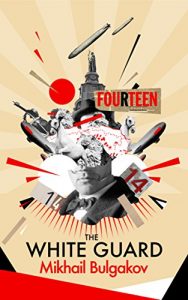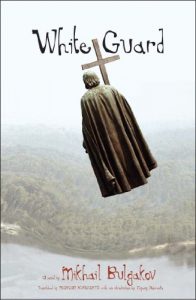Reds, Whites, German troops, and Ukrainian nationalists battle for control of the city as the war becomes more tumultuous in Mikhail Bulgakob’s debut novel, The White Guard.
The book is heavily autobiographical, drawing from the author’s own experiences in Ukraine during the Russian Civil War—he witnessed ten of these changes of government himself. Told from alternating points of view and taking an unusual angle in the conflict between Russian Whites (with whom the Turbins identify) and Ukrainian nationalists, The White Guard elegantly portrays the chaos of a civil war in which there is no good or evil, only loyalty to one’s friends, family, and one’s convictions.
The White Guard first appeared in serial form in 1925 in Rossiya, a Soviet-era literary journal. The journal was closed down before the story was completed, and the story was not reprinted in Russia until 1966. What was published before the shutdown was so popular that Bulgakov was urged to rewrite the story for the stage, which he did in 1926 under the name The Days of the Turbins. The stage version downplayed the original’s anti-Communist sentiments, and was met with widespread acclaim. The production ran from 1926 to 1941, saw nearly a thousand performances, and found an unlikely fan in Soviet dictator Stalin, though Bulgakov continued to be harassed by the press and by Stalin’s authorities for the rest of his career.
The Alma Classics edition of The White Guard is translated by Roger Cockrell with the authorization of the Bulgakov Estate and Andrew Nurnberg Associates. Roger Cockrell was previously the Head of the Department of Russian at the University of Exeter and has worked extensively on expert translations of Russian works such as The Fatal Eggs. His translation reflects the clear, humorous, and profound language of the original with colloquial English idioms and phrasings. Readers without previous experience in Russian literature will find this translation to be accessible and fun, even though the subtext of Bulgakov’s works is the murky, mysterious underbelly of Soviet culture.
Mikhail Bulgakov was a Russian playwright, novelist, and physician best known for his satirical classic, The Master and Margarita. Born in Kiev in 1891, Bulgakov was drawn to both literature and the theater from his early youth. As a young man, Bulgakov studied to become a doctor and volunteered with the Red Cross during the First World War. He practiced medicine for some years after WWI, and was eventually drafted as an army physician during the Russian Civil War. He contracted typhus and nearly died at his posting, and after a shaky recovery he began his professional transition from physician to playwright and author.
From 1919 until his death in 1940, his plays, short stories, and novels enjoyed degrees of critical and popular success, but Bulgakov also endured a great deal of criticism and censorship due to his propensity to mercilessly satirize the ethical and political shortcomings of life in the Soviet Union. His witty, biting, and frequently grotesque storytelling style caught the eye of Joseph Stalin, earning him some degree of political immunity. By the end of the 1920s, however, Bulgakov’s career had ground to a halt due to a government ban on the performance or publication of his work. Bulgakov’s relationship with Stalin protected him from arrest and execution, but he could not publish any of his works or stage his plays for the remaining years of his life.
Over the next decade, the ailing writer began work on The Master and Margarita, which would be his last major creative effort before his death. A brilliant satire of Soviet society, it was not published until 1966, 26 years after his death. Although he never experienced stable success and renown during his life, Bulgakov’s body of work is now firmly situated within the pantheon of great 20th century Russian literature an
The book is heavily autobiographical, drawing from the author’s own experiences in Ukraine during the Russian Civil War—he witnessed ten of these changes of government himself. Told from alternating points of view and taking an unusual angle in the conflict between Russian Whites (with whom the Turbins identify) and Ukrainian nationalists, The White Guard elegantly portrays the chaos of a civil war in which there is no good or evil, only loyalty to one’s friends, family, and one’s convictions.
The White Guard first appeared in serial form in 1925 in Rossiya, a Soviet-era literary journal. The journal was closed down before the story was completed, and the story was not reprinted in Russia until 1966. What was published before the shutdown was so popular that Bulgakov was urged to rewrite the story for the stage, which he did in 1926 under the name The Days of the Turbins. The stage version downplayed the original’s anti-Communist sentiments, and was met with widespread acclaim. The production ran from 1926 to 1941, saw nearly a thousand performances, and found an unlikely fan in Soviet dictator Stalin, though Bulgakov continued to be harassed by the press and by Stalin’s authorities for the rest of his career.
The Alma Classics edition of The White Guard is translated by Roger Cockrell with the authorization of the Bulgakov Estate and Andrew Nurnberg Associates. Roger Cockrell was previously the Head of the Department of Russian at the University of Exeter and has worked extensively on expert translations of Russian works such as The Fatal Eggs. His translation reflects the clear, humorous, and profound language of the original with colloquial English idioms and phrasings. Readers without previous experience in Russian literature will find this translation to be accessible and fun, even though the subtext of Bulgakov’s works is the murky, mysterious underbelly of Soviet culture.
ABOUT THE AUTHOR
Mikhail Bulgakov was a Russian playwright, novelist, and physician best known for his satirical classic, The Master and Margarita. Born in Kiev in 1891, Bulgakov was drawn to both literature and the theater from his early youth. As a young man, Bulgakov studied to become a doctor and volunteered with the Red Cross during the First World War. He practiced medicine for some years after WWI, and was eventually drafted as an army physician during the Russian Civil War. He contracted typhus and nearly died at his posting, and after a shaky recovery he began his professional transition from physician to playwright and author.
From 1919 until his death in 1940, his plays, short stories, and novels enjoyed degrees of critical and popular success, but Bulgakov also endured a great deal of criticism and censorship due to his propensity to mercilessly satirize the ethical and political shortcomings of life in the Soviet Union. His witty, biting, and frequently grotesque storytelling style caught the eye of Joseph Stalin, earning him some degree of political immunity. By the end of the 1920s, however, Bulgakov’s career had ground to a halt due to a government ban on the performance or publication of his work. Bulgakov’s relationship with Stalin protected him from arrest and execution, but he could not publish any of his works or stage his plays for the remaining years of his life.
Over the next decade, the ailing writer began work on The Master and Margarita, which would be his last major creative effort before his death. A brilliant satire of Soviet society, it was not published until 1966, 26 years after his death. Although he never experienced stable success and renown during his life, Bulgakov’s body of work is now firmly situated within the pantheon of great 20th century Russian literature an











